Blue gold: K-State Frontier Field Trip inspects systems for water management in Northern California
Recent national headlines about the threat of cyberattacks to water systems underscore the relevance of a recent field trip to California by a group of K-State students.
As part of the 41st field trip in the Frontier program, professors Justin Kastner, Jason Ackleson and Ellyn Mulcahy led a group of eight students to Northern California.
“Students were able to observe the scope and complexity of the extraordinary Hetch Hetchy Regional Water System, as well as learn from distinguished scholars studying drought-related health challenges at the human-animal interface,” said Dr. Kastner, professor of food safety and security in the College of Veterinary Medicine. “We encouraged them to reflect on past waterborne disease outbreaks and subsequent regulatory responses and engage in archival research related to the history of environmental and public health.”
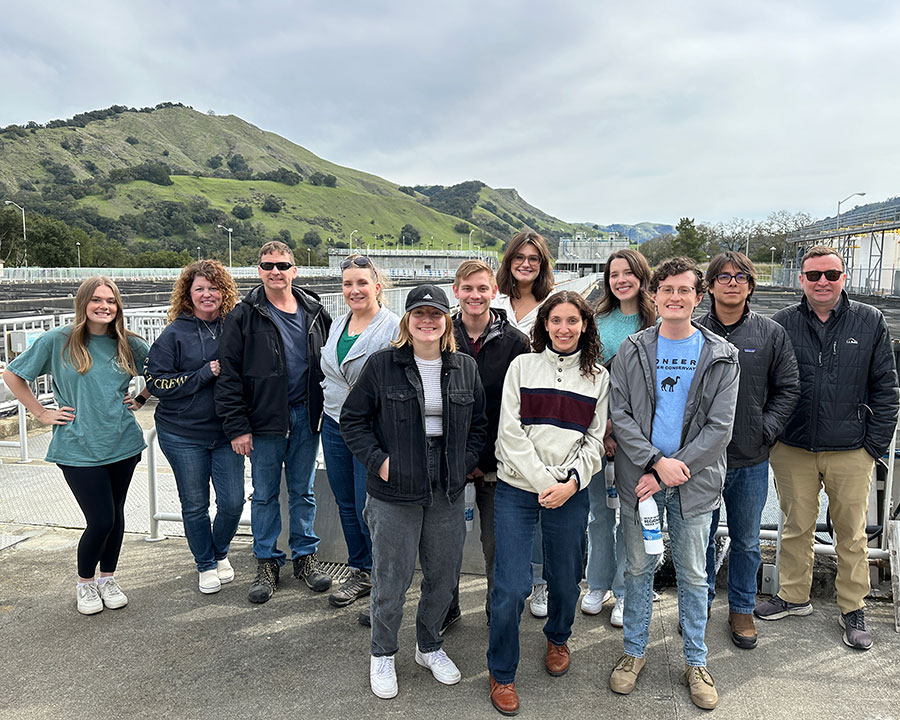
Left to right: Students and subject matter experts gather for a picture at one of several nodes in the Hetch Hetchy aqueduct system. Pictured, left to right: Maddie Dee (KSU), Adrian Crabtree (KSU), Justin Sibbring (plant superintendent, Sunol Valley Water Treatment Plant), Alison Kastama (Regional Liaison, Hetch Hetchy Regional Water System and the San Francisco Public Utilities Commission), Karsen DeWeese (KSU), Zane Kohl (KSU), Alexa Heseltine (KSU), Bri Schock (KSU), Emma Uridge (KSU), Chris Carter (KSU), Ernesto Rojas Sanchez (University of California-Davis), Dr. Jason Ackleson (U.S. Department of Homeland Security, also adjunct KSU faculty member and Frontier Field Trip co-director).
Participants came from across campus and various majors. Two master of public health (MPH) students who went on and assisted with the journey included Chris Carter and Karsen DeWeese.
“Public health has been more in the public eye since everyone experienced COVID, but not many know just how far it extends,” Karsen said. “Public health is generally unseen unless an issue arises, just like the pandemic. This includes many factors of life, including the wonderful privilege of always having clean water at the turn of a handle.”
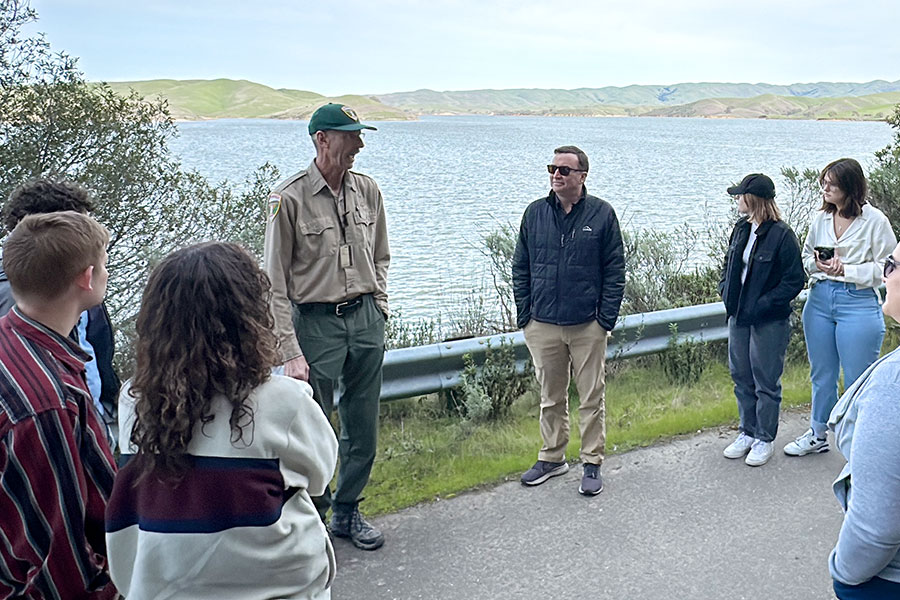
The Hetch Hetchy system consists of multiple nodes of infrastructure, including the San Antonio Reservoir in the foreground.
“One of the oldest objectives in the field of public health is to secure a safe and stable water supply,” Chris said. “Systems such as the Hetch Hetchy Aqueduct are a continuation of that endeavor. As a scholar of the public health implications of drought, it was great to witness the capacity of modern aqueduct systems to protect regions like San Francisco from droughts.”
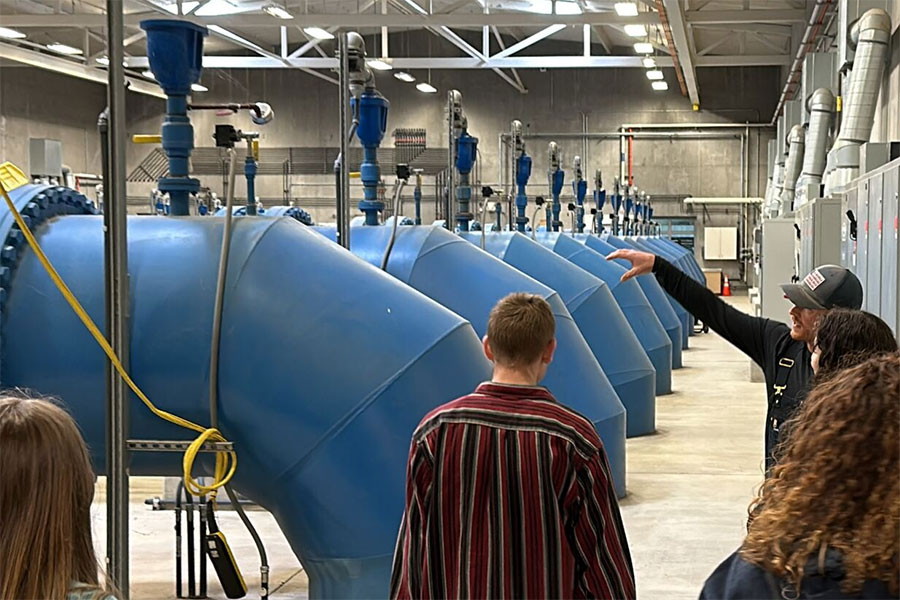
Frontier Field Trip students receiving a tour inside of one of the treatment facilities along the 167-mile-long Hetch Hetchy system; the students had a rare opportunity to witness first-hand the operations used to ensure the safety, security, and operation of this critical infrastructure in northern California.
Other participants included Alexa Heseltine, undergraduate majoring in medical microbiology with a minor in gender, women, and sexuality studies, and pursuing a global health, medicine, and society certificate; Adrian Crabtree, master’s student in food science (who lives in northern California and pursues studies at K-State via distance learning); Bri Schock: undergraduate majoring in geography; Emma Uridge, MPH student; Madeline Dee: undergraduate majoring in Microbiology; and Zane Kohl: undergraduate double-majoring in biochemistry and microbiology.
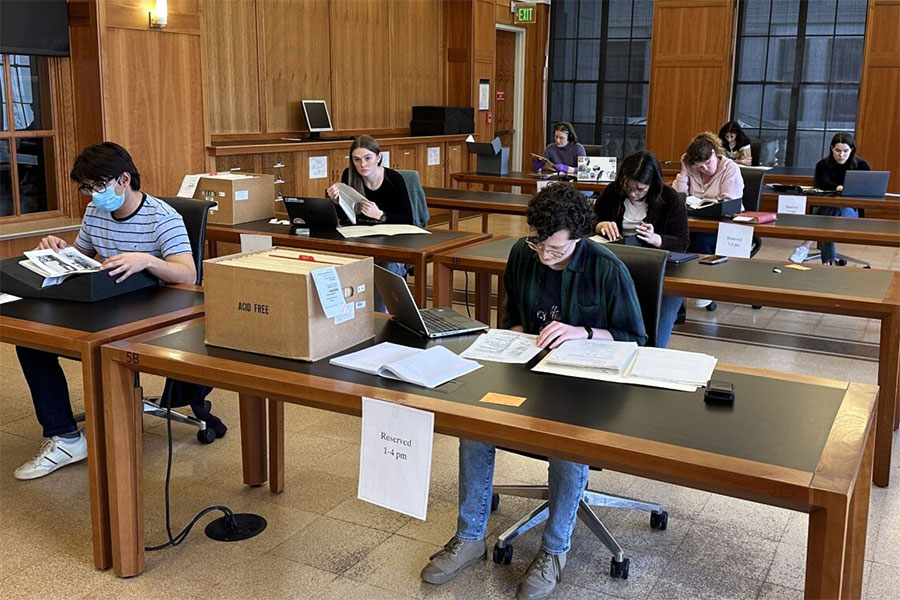
A key part of the Frontier Field Trip experience is conducting archival research on the multidisciplinary topic at hand (for the 41st FFT, water). Here at the Bancroft Library at UC-Berkeley, students spent time exploring primary source documents (regarding water-infrastructure development, past waterborne disease outbreaks, etc.).
Students met with subject-matter experts from both UC-Berkeley and UC-Davis (including Dr. Jane Sykes, who earned an MPH at K-State in 2023); they shared their research on drought, climate change, water insecurity, and such challenges as coccidioidomycosis, an infection caused by the fungus Coccidioides and also known as San Joaquin Valley, or Valley, fever. One part of the trip included an escorted tour of the San Francisco Public Utilities Commission.
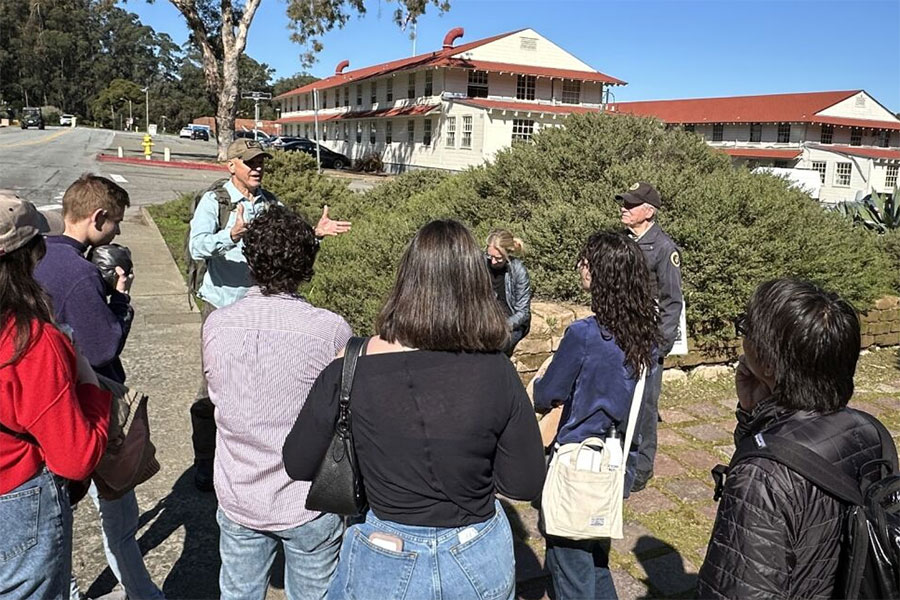
Dr. Zach Mills, a K-State graduate, DVM 1999 and MPH 2023, gives students some history about the Presidio, a former Army post near the Golden Gate Bridge in San Francisco. He also talked about military history, infectious disease and public service.
“Participatory educational experiences like the trip to California help highlight these important areas of public health while providing fun and the opportunity to build community and professional networks,” Karsen said. “One of the key takeaways I have is that our water system across the country does an incredible amount of work every single day, and I have a much deeper appreciation for those who contribute to ensuring these systems all run smoothly.”
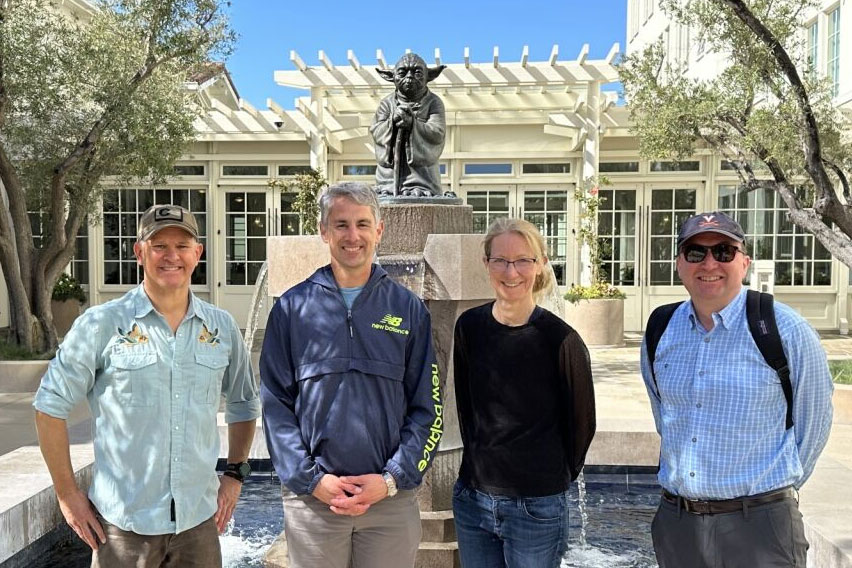
Drs. Mills, Kastner, Jane Sykes, professor of veterinary medicine at UC Davis, and Jason Ackleson visit the Yoda Foundation outside the Letterman Digital Arts Center at the Presidio.
About Frontier Field Trips
The Frontier Field Trip program was started by Dr. Kastner and Dr. Ackleson in 2007. It provides scholars the opportunity to explore disciplines other than their own, which is particularly relevant to public health.
The interactive, immersive field trips help students explore different career opportunities and let them connect with others outside of their academic disciplines.
MPH students who participated in this program were in part supported by the Health Resources and Services Administration (HRSA) of the U.S. Department of Health and Human Services (HHS). The contents of this story are those of the author(s) and do not necessarily represent the official views of, nor an endorsement, by HRSA, HHS or the U.S. Government.